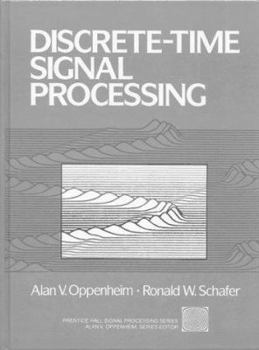Discrete-Time Signal Processing
Select Format
Select Condition 
Book Overview
THE definitive, authoritative guide to DSP -- ideal for those with an introductory-level knowledge of signals and systems -- but not necessarily DSP. Written by a prominent, standard-setting team. KEY... This description may be from another edition of this product.
Format:Hardcover
Language:English
ISBN:013216292X
ISBN13:9780132162920
Release Date:January 1989
Publisher:Prentice Hall
Length:879 Pages
Weight:0.30 lbs.
Dimensions:1.5" x 7.3" x 9.6"
Customer Reviews
4 ratings
Discrete-Time Signal Processing
Published by Thriftbooks.com User , 16 years ago
I've used D.T.S.P. for a course and found it very satisfying. I've also read the Schaum's Outline by Monson Hayes and "Understanding Digital Signal Processing" by Richard Lyons, but I wouldn't recommend them to anyone really interested in the subject. This book can appear more intimidating at a first glance, but chances are that is just the fear of a mind not accustomed to precise, throughout exposition. Actually, such preciseness is the only way to really understand a subject and it is much harder to learn something without it (although, it's easier to delude oneself into thinking that one is learning). While studying on the Hayes' book I often found myself trying to reconstruct the steps taken to build and use a mathematical representation of a problem, and realizing that there were some informations I was missing; that the exposition made sense only as long as I didn't put it under a magnifying glass to see the holes. As my interest for DSP and my hunger for thoroughness grew I had to turn more and more to the Oppenheim-Schafer in order to find the missing steps, until I decided that it would have been easier to use it as my primary book. As for the requirements, there isn't really much: some basic calculus and, for some chapters, a knowledge of analog systems - something that you have probably already studied if you are doing this for university, and something that you should study if you are a diy enthusiast. If this isn't your biggest interest and you only need to pass an exam, the Schaum's outline should be enough. If you want to build a solid foundation in DSP design, acquire new mathematical models and the skill to use them (in my opinion this is a central part in increasing one's intelligence) use this book.
Reference or introduction?
Published by Thriftbooks.com User , 23 years ago
I found this book to be an excellent fundamental text about DSP. But is it a good introductory book for beginners? Well, it depends... The book covers the essential topics in great depth and that means every one of its 800+ pages is packed with concepts and details and examples. The style is clear, but the amount of information can be a little overwhelming when you read it for the first time. If you have time, patience, a good maths background, the desire to master the subject, and someone to clarify your doubts, this can be the best first book on DSP you could ever buy. If you just want to learn the basics, and don't have much time or patience you should probably look elsewhere.
The reference for DSP
Published by Thriftbooks.com User , 23 years ago
This is probably the most complete reference in DSP. It's full of examples covering the whole stuff in DSP. However this is certainly not fur use as an introductory book because the aim is not the explanation of fundamental concepts in DSP (for that go to Lyons "Understanding Digital Signal Processing"). Maybe it is possible to learn DSP with this book but then as a companion of a good undergrad course, not for self-study.As stated by another reviewer, this book is over-crowded with developments, details and examples that could be overwhelming to the newcomer. This is probably its biggest drawback, in that its completeness hinders on its readability. So be aware that this is not an easy DSP book, it's THE DSP book.
Not a beginners book
Published by Thriftbooks.com User , 24 years ago
Although the authors say this book could be used as an introductory text in DSP, it is not. This book is a no nonsense approach towards DSP. You need firm grounding in calculus, signals and systems to be close to even understand what the authors intend to say. With a good professor and with the skill set that the authors assume you have, you will find this a life long reference. How ever for the not so sure Stanley's Digital Signal processing is a much better choice. The beginner should find Richard Lyon's Understanding DSP to be more user friendly, but if you outgrow Lyon, then this is the book that would whet your appetite.This book will be one you will frequently refer to clear your doubts.






